Over the years, I’ve encountered countless cases of ear infections and complications in our furry friends. Many of these issues could have been prevented with proper ear hygiene and the right cleaning solutions. It’s crucial for dog owners to understand the importance of ear health and the role it plays in the overall well-being of their pets. In this blog, I’ll be sharing my expert insights on the best over-the-counter ear cleaners for dogs, ranked based on their efficacy and safety. My aim is to guide you in making informed choices that ensure the health and comfort of your beloved canine companions. Let’s dive in and explore the world of dog ear care together.

Why is Regular Ear Cleaning Important for Dogs?
Dogs, much like humans, can be susceptible to a variety of ear-related issues. Their ears, especially in breeds with floppy or dense ear structures, provide an ideal environment for the growth of bacteria and yeast. Regular ear cleaning is not just a grooming routine; it’s a preventive health measure. Here’s why it’s paramount:
- Prevention of Infections: The warm, moist environment inside a dog’s ear can be a breeding ground for bacteria and yeast. Regular cleaning helps remove the debris and wax that these microorganisms thrive on, reducing the risk of infections.
- Early Detection of Issues: Regularly checking and cleaning your dog’s ears allows you to spot potential problems early on, such as mites, ticks, or foreign objects. Early detection can prevent complications and make treatments more effective.
- Avoidance of Painful Conditions: Ear infections can be extremely painful for dogs. They might shake their heads, scratch incessantly, or even whine. Regular cleaning can prevent such discomfort and pain.
- Improved Hearing: Just like in humans, excessive wax or debris can impair a dog’s hearing. By maintaining clean ears, you ensure that your dog’s hearing is at its best.
- Strengthening the Bond: The act of cleaning your dog’s ears can also serve as a bonding activity. It’s a time for you to reassure your pet, making them feel safe and cared for.
- Prevention of Odors: Unclean ears can produce a foul smell, which is often the first sign pet owners notice when an infection is present. Regular cleaning keeps your dog smelling fresh.
Regular ear cleaning is not just about aesthetics or hygiene; it’s about ensuring the health, comfort, and happiness of your canine companion. As a veterinarian, I cannot stress enough the importance of this simple yet crucial routine. By incorporating it into your pet care regimen, you’re taking a proactive step towards a happier and healthier pet.

Factors to Consider When Choosing an Ear Cleaner
Selecting the right ear cleaner for your dog is crucial. With a myriad of products available in the market, it can be overwhelming for pet owners to make an informed choice. As a veterinarian, I’ve seen the good, the bad, and the ugly when it comes to ear cleaning solutions. Here are some essential factors you should consider:
Ingredients:
- Natural vs. Chemical: Some cleaners boast all-natural ingredients, which can be gentler on your dog’s ears. However, some conditions might require stronger, medicated solutions. Always check the ingredient list and be wary of harsh chemicals that might irritate your dog’s ears.
- Active Agents: Look for ingredients known to combat common ear issues, such as salicylic acid for yeast or hydrocortisone for inflammation.
Consistency:
- Liquid vs. Gel: While liquid solutions can penetrate deeper and are easier to apply, gels might stay in the ear longer, providing prolonged relief. The choice often depends on your dog’s specific needs and your comfort in applying the product.
Application Method:
- Drops, Wipes, or Sprays: Drops are the most common and can be effective for deeper cleaning. Wipes are great for surface cleaning and quick touch-ups, while sprays can be easier for some pet owners to apply without stressing the dog.
- pH Balance: A balanced pH ensures that the cleaner is neither too acidic nor too alkaline, both of which could irritate the ear canal. Ideally, an ear cleaner should mimic the natural pH of a dog’s ear.
- Price and Brand Reputation: While it’s tempting to go for cheaper options, it’s essential to ensure you’re getting a quality product. Research brands, read reviews, and if in doubt, consult with your veterinarian.
- Alcohol vs. Alcohol-Free: Alcohol can be effective in drying out the ear, which can be beneficial in some cases. However, it can also cause stinging, especially if the ear is inflamed or has open sores. Alcohol-free solutions might be gentler for regular cleaning.
- Fragrance: While a pleasant scent might be appealing to pet owners, some fragrances can irritate a dog’s sensitive ears. It’s often best to opt for fragrance-free or cleaners with natural, mild scents.
In essence, choosing the right ear cleaner for your dog is a balance between efficacy and gentleness. It’s always a good idea to start with a milder solution and consult with your veterinarian, especially if your dog has a history of ear issues or shows signs of discomfort after cleaning.
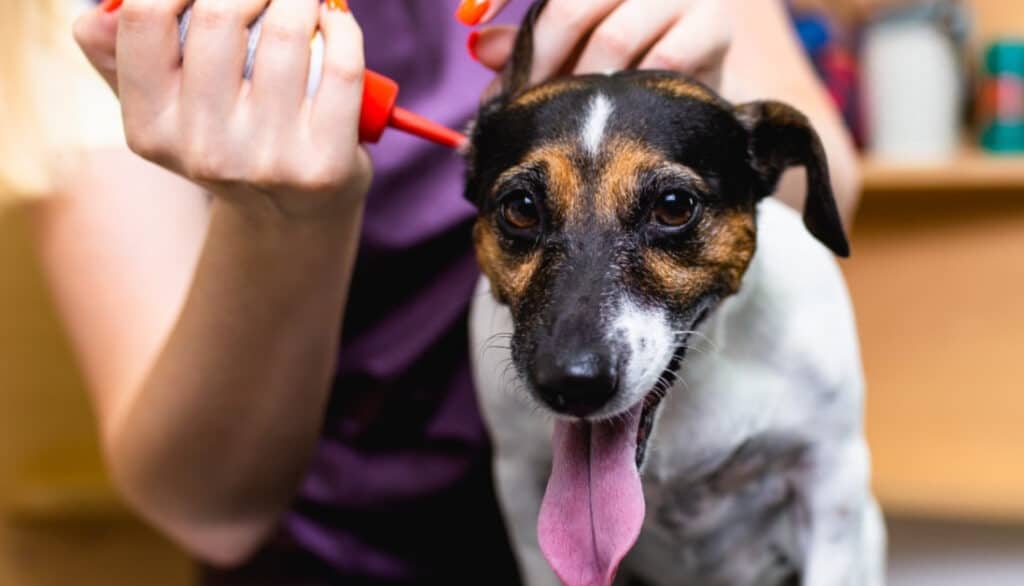
Top 5 OTC Dog Ear Cleaners Ranked by Dr. Candy
Navigating the vast array of over-the-counter dog ear cleaners can be daunting. As a veterinarian, I’ve had the opportunity to test, review, and recommend various products to my clients. Based on my experience and observations, here are my top 5 picks for OTC dog ear cleaners:
Dechra EpiKlean Ear Cleanser for Cats and Dogs
Dechra EpiKlean Ear Cleanser is an all-purpose cleaner specifically designed for cats and dogs that are free from ear infections but require routine cleaning. The cleanser is proudly made in the USA, ensuring high-quality production and safety standards. The product is formulated to cleanse and dry the ears of pets, preventing potential irritants and obstructions, including moisture that can lead to fungal growth.
PROs:
- The cleanser is versatile, suitable for both cats and dogs.
- It is manufactured in the USA, ensuring adherence to American safety standards.
- The product effectively removes potential irritants and moisture, reducing the risk of fungal infections.
CONs:
- Regular maintenance is required as it’s designed for pets that are ear infection-free.
- The cleanser is not antifungal or antibacterial, so it may not be suitable for treating existing infections.
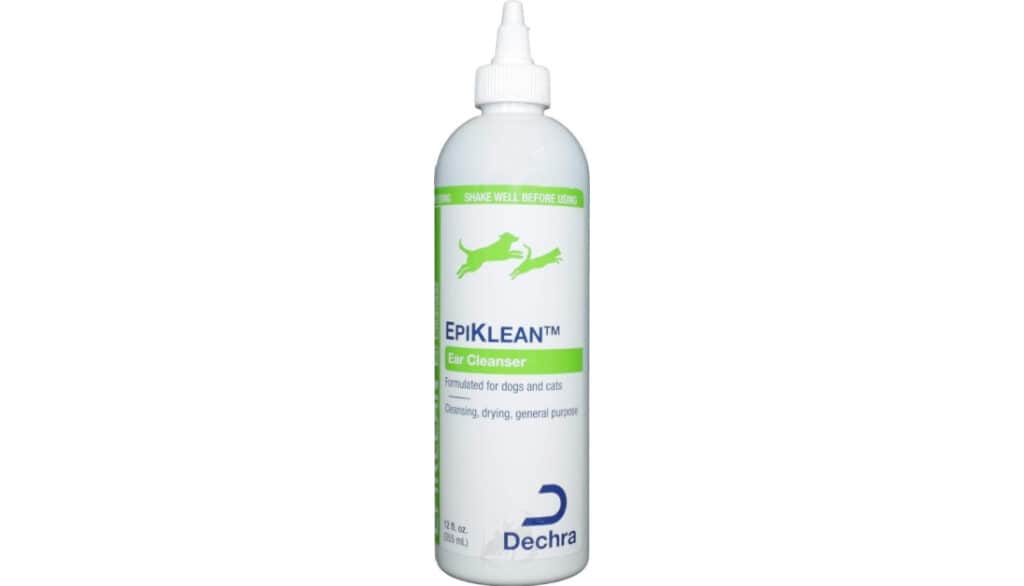
Veterinary Formula Clinical Care Ear Therapy
Veterinary Formula Clinical Care Ear Therapy is a medicated treatment formulated to alleviate infections, inflammation, and wax build-up. It is suitable for both dogs and cats, ensuring a broad spectrum of use. The formula is pH balanced, alcohol-free, and contains aloe vera to soothe the ear canal.
PROs:
- Alleviates infections, inflammation, and wax build-up effectively.
- Suitable for both dogs and cats, offering versatility.
- Contains aloe vera, providing a soothing effect on the ear canal.
CONs:
- May require consistent application for optimal results.
- Some animals might be sensitive to its ingredients.
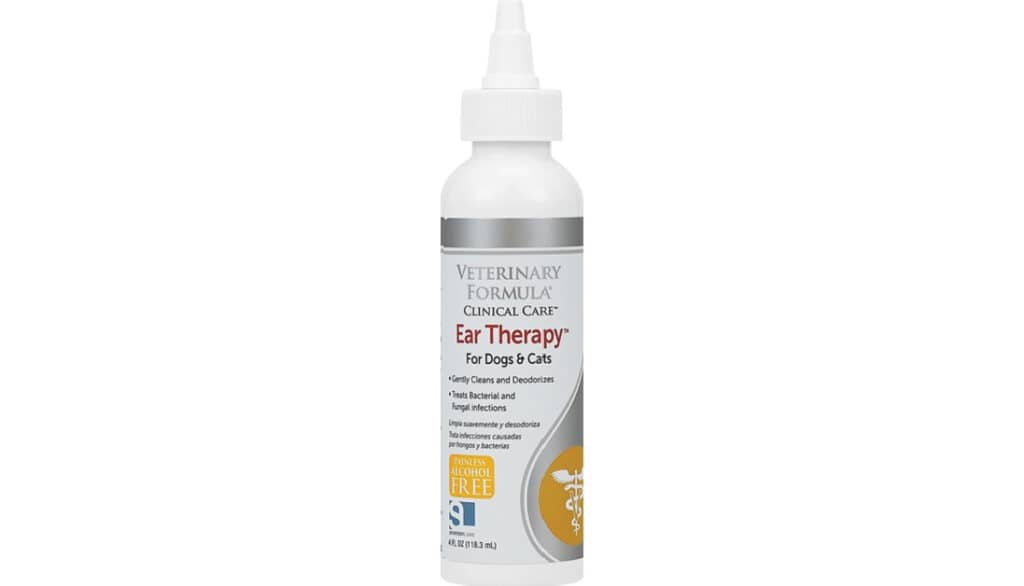
Virbac Epi-Otic Advanced Ear Cleanser for Dogs
Virbac Epi-Otic Advanced Ear Cleanser is a non-irritating ear cleanser formulated with anti-adhesive properties to prevent microbial attachment. It is specifically designed for dogs with chronic otitis externa, a condition of the outer ear. The cleanser’s patented anti-odor technology eliminates ear canal odor, making it a suitable solution for maintaining ear hygiene.
PROs:
- Formulated with anti-adhesive properties that deter microbial growth.
- Designed to address chronic otitis externa in dogs, targeting a specific health concern.
- Features patented anti-odor technology to combat ear canal odor.
CONs:
- The product might be more specialized and not suitable for general ear cleaning.
- Some dogs might be sensitive to the ingredients, leading to potential irritation.
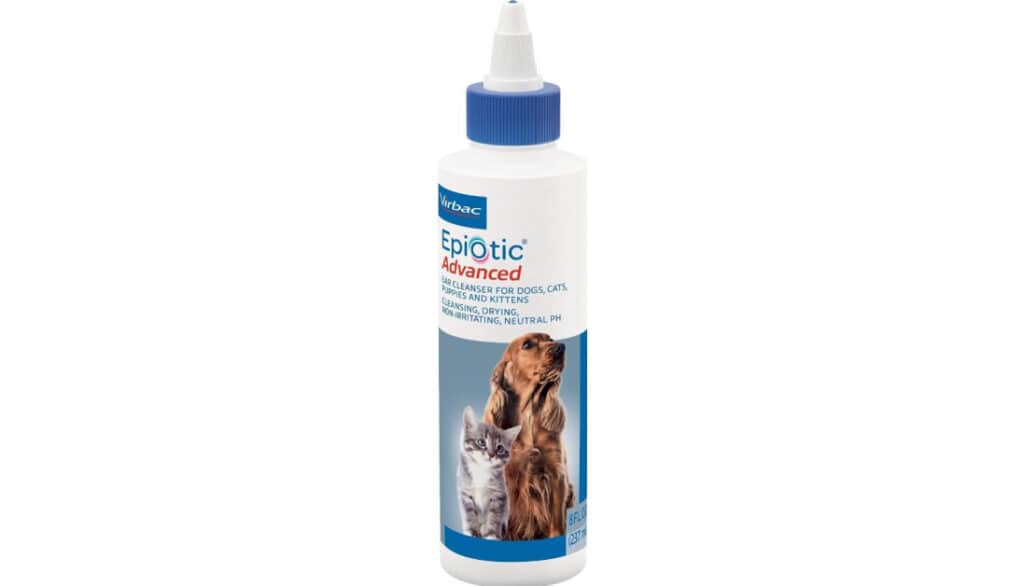
Zymox Otic Enzymatic Solution for Dogs
Zymox Otic Enzymatic Solution is a non-invasive solution designed to treat acute and chronic otitis externa caused by bacterial, fungal, and yeast infections. The solution contains hydrocortisone, which aids in reducing inflammation and itchiness. It is a no-pre-cleaning treatment, meaning it can be directly applied to the ears without the need for prior cleaning.
PROs:
- Effectively treats acute and chronic otitis externa caused by various infections.
- Contains hydrocortisone to alleviate inflammation and itching.
- Simplifies the treatment process with its no-pre-cleaning feature.
CONs:
- The solution may not be suitable for all dogs, especially those with known allergies to ingredients.
- Consistent usage is required for optimal results, which might be cumbersome for some pet owners.
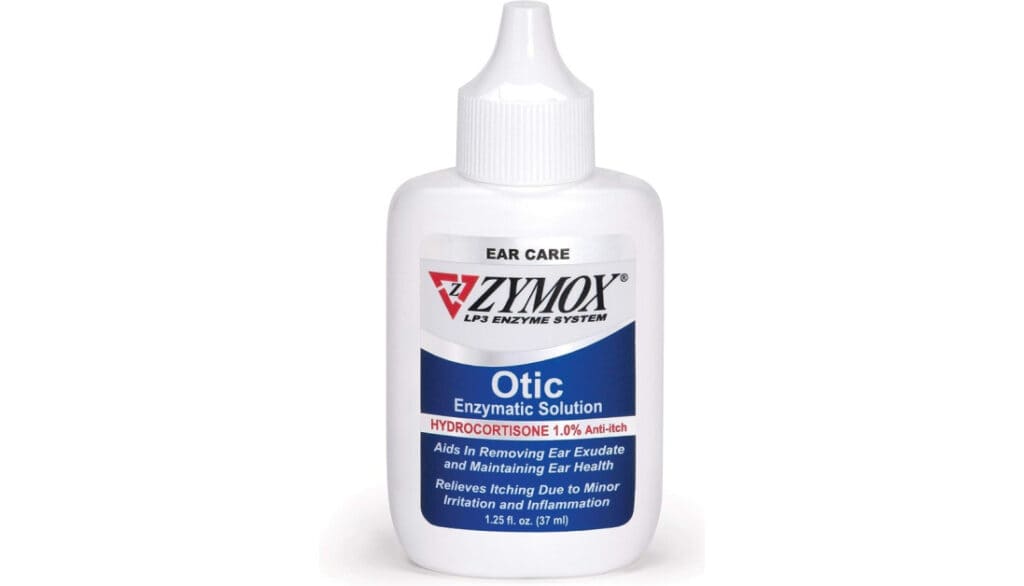
Vet’s Best Ear Relief Wash Cleaner for Dogs
Vet’s Best Ear Relief Wash Cleaner for Dogs is a veterinarian-formulated ear cleaner designed to cleanse and soothe raw, irritated, itchy, and smelly dog ears. The formula is alcohol-free and contains a unique blend of natural ingredients such as yucca, clove oil, and echinacea. It’s suitable for all dogs and puppies over 12 weeks old and is designed to prevent ear odor, itching, and the accumulation of wax.
PROs:
- Veterinarian-formulated, ensuring a professional and effective approach to ear care.
- Contains natural ingredients, reducing the risk of side effects and allergic reactions.
- Alcohol-free formula, ensuring it’s gentle on the dog’s ears and doesn’t cause dryness.
CONs:
- May require regular application for optimal results.
- Some dogs might be sensitive to certain natural ingredients, necessitating patch testing before full use.
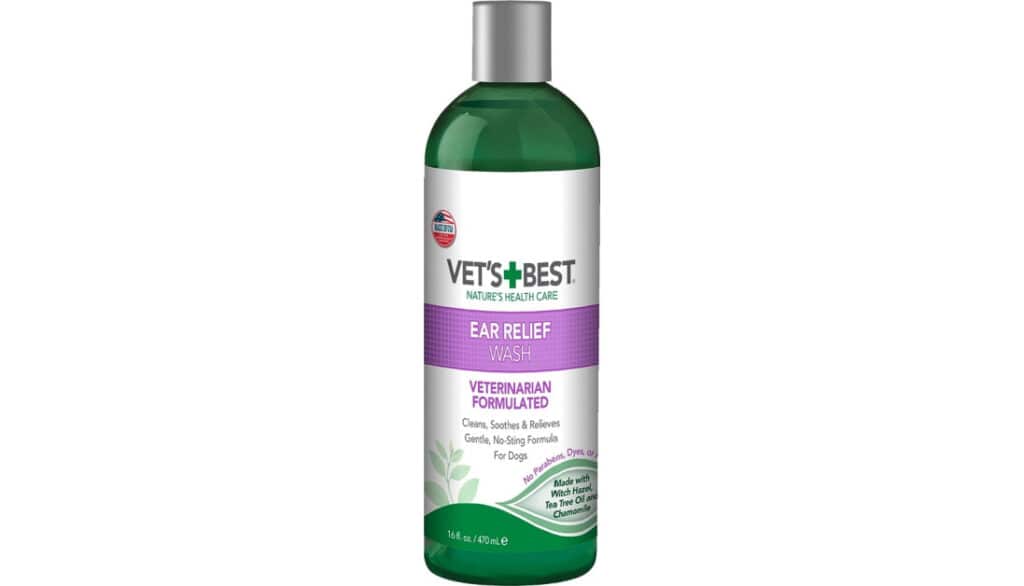
While these are my top picks, it’s essential to choose a product that aligns with your dog’s specific needs. Always monitor your dog’s reaction after using a new product and consult with your veterinarian if you notice any adverse reactions or if the ear issues persist.
How to Properly Clean Your Dog’s Ears
Cleaning your dog’s ears might seem like a daunting task, especially if your furry friend is a bit skittish. However, with the right technique and a calm approach, it can be a stress-free experience for both of you. I’ve guided countless pet owners through this process. Here’s a step-by-step guide to ensure you’re cleaning your dog’s ears safely and effectively:
Preparation:
- Gather Supplies: Ensure you have your chosen ear cleaner, cotton balls or pads, and treats for rewarding your dog afterward.
- Choose a Calm Environment: Find a quiet spot where your dog feels comfortable, away from distractions.
Positioning Your Dog:
- If possible, have someone assist you by gently holding the dog or providing comfort. For smaller dogs, placing them on a table or elevated surface might make the process easier.
Inspect the Ear:
- Before cleaning, take a moment to inspect the ear. Look for signs of redness, swelling, discharge, or any foreign objects. If you notice severe issues, it might be best to consult with a vet before proceeding.
Application of the Cleaner:
- Gently hold the ear flap (pinna) upright to expose the ear canal.
- Carefully pour or squeeze the recommended amount of ear cleaner into the ear canal. Ensure you don’t insert the applicator tip too deep.
- Gently massage the base of the ear for about 20-30 seconds. You should hear a squishing sound, which helps in breaking up debris inside.
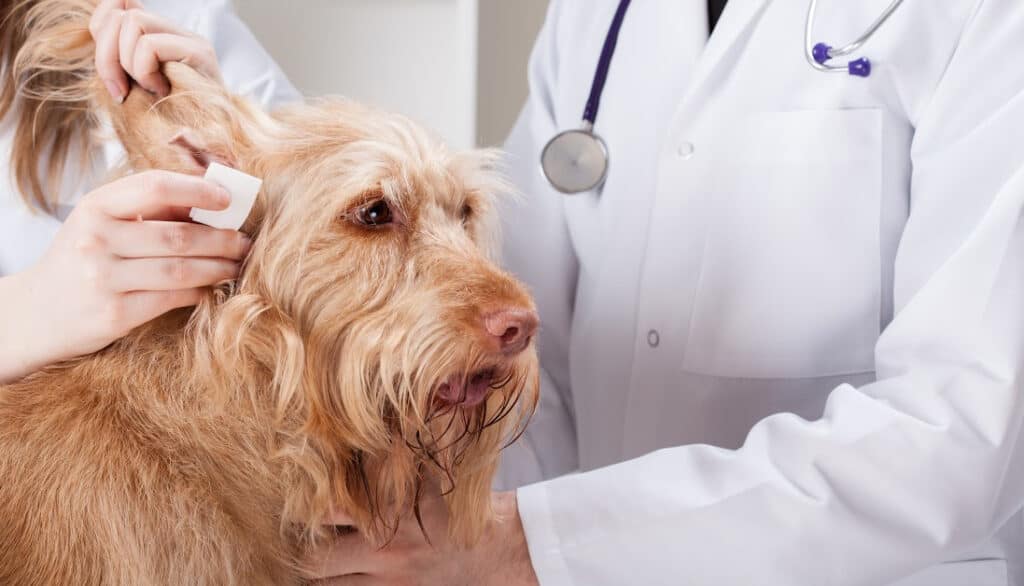
Allow Your Dog to Shake:
- After massaging, let go of the ear. Your dog will likely shake its head, which helps in bringing the loosened debris and excess cleaner to the surface.
Wipe Away Debris:
- Using a cotton ball or pad, gently wipe the inside of the ear flap and the entrance of the ear canal. Do not insert anything deep into the ear canal.
- Continue wiping until no more debris comes out on the cotton.
Reward and Comfort:
- Once done, reward your dog with a treat and some affection. This positive reinforcement will make future cleanings easier.
Repeat for the Other Ear:
- If both ears need cleaning, repeat the process for the other ear.
Post-Cleaning Inspection:
- After cleaning, inspect the ears again to ensure they look clean and free from redness or irritation.
Tips:
- Never use Q-tips or pointed objects in your dog’s ear, as they can push debris further in or damage the eardrum.
- If your dog shows signs of discomfort or pain during cleaning, stop immediately and consult with a veterinarian.
- Regularly inspecting and cleaning your dog’s ears can prevent many common ear issues.
Cleaning your dog’s ears is an essential aspect of their overall health and well-being. With patience, consistency, and the right technique, it can become a routine both you and your dog get accustomed to.

Signs Your Dog Might Need a Professional Ear Cleaning or Check-Up
While regular at-home ear cleaning is beneficial for maintaining your dog’s ear health, there are instances when professional intervention is necessary. Here are some signs that indicate your dog might need a professional ear cleaning or a check-up:
- Persistent Scratching: If your dog is constantly scratching its ears or shaking its head, even after regular cleanings, it could be a sign of an underlying issue.
- Unpleasant Odor: A foul smell emanating from the ears is often a clear indication of an infection.
- Visible Discharge: Yellow, brown, or bloody discharge is a cause for concern. It can be indicative of bacterial or yeast infections, or even a ruptured eardrum.
- Redness and Swelling: If the inner ear appears red, swollen, or feels warm to the touch, it could be a sign of inflammation or infection.
- Whining or Pain: If your dog yelps when its ears are touched or seems in pain, it’s crucial to seek professional help immediately.
- Hearing Loss: If you notice your dog isn’t responding to sounds or commands as usual, or seems disoriented, it could be experiencing hearing issues.
- Unusual Behavior: Changes in behavior, like loss of balance, walking in circles, or tilting the head to one side, can be indicative of inner ear problems or more severe conditions.
- Foreign Objects: Dogs are curious creatures. If you suspect they’ve gotten something stuck in their ear, like grass seeds, twigs, or even insects, it’s best to let a professional remove it to avoid injury.
- Chronic Issues: Some dogs, especially certain breeds, are prone to recurrent ear issues. If you find yourself treating the same problem repeatedly, a vet might offer a more long-term solution or identify an underlying cause.
While regular home maintenance is essential, there are times when professional care is non-negotiable. Always trust your instincts as a pet owner. If something seems off, it’s better to be safe and consult with your veterinarian.

Conclusion
Ear health is an integral aspect of your dog’s overall well-being. As we’ve explored in this guide, regular ear cleaning can prevent a myriad of issues, from minor irritations to severe infections. But it’s not just about cleaning; it’s about being observant, understanding the signs of potential problems, and seeking professional help when needed.
As a veterinarian, I’ve witnessed the difference proactive ear care can make in a dog’s life. It’s not just about preventing discomfort or health issues; it’s about ensuring your furry friend can enjoy the world around them without the hindrance of ear problems. Whether you’re choosing an ear cleaner or learning the proper cleaning technique, always prioritize your dog’s comfort and safety.
Thank you for joining me on this journey into the world of canine ear care. I hope this guide empowers you to make informed decisions for your pet’s health. Remember, a little attention to detail and regular care can lead to a happier, healthier life for your beloved companion.
Frequently Asked Questions
Answer: The frequency of ear cleaning varies depending on the breed, age, and health of your dog. Dogs with floppy ears or those prone to ear infections might require more frequent cleanings, perhaps once a week. On the other hand, dogs with upright ears and no history of ear issues might only need cleaning once a month. Always monitor your dog’s ears and adjust the cleaning routine based on their needs.
Answer: If your dog shows signs of discomfort, pain, or unusual behavior after an ear cleaning, it’s crucial to stop using the product and consult with your veterinarian immediately. They can provide guidance on the next steps and recommend alternative products or treatments if needed.
Answer: Yes, some breeds are more susceptible to ear problems due to their ear structure, hair growth inside the ear, or genetic predispositions. Breeds with floppy ears, like Basset Hounds, Cocker Spaniels, and Golden Retrievers, often require more diligent ear care. Regular inspections and cleanings can help prevent issues in these breeds.
Answer: It’s essential to use products formulated specifically for dogs. Human ear cleaners or home remedies might not be pH balanced for dogs and could cause irritation or adverse reactions. If you’re considering a home remedy, always consult with your veterinarian first.
Answer: If you suspect an infection, it’s best to consult with a veterinarian before attempting to clean your dog’s ears. Cleaning an infected ear without proper guidance can exacerbate the issue or cause pain to your dog. Your vet can provide appropriate treatments and guide you on cleaning protocols during the healing process.
